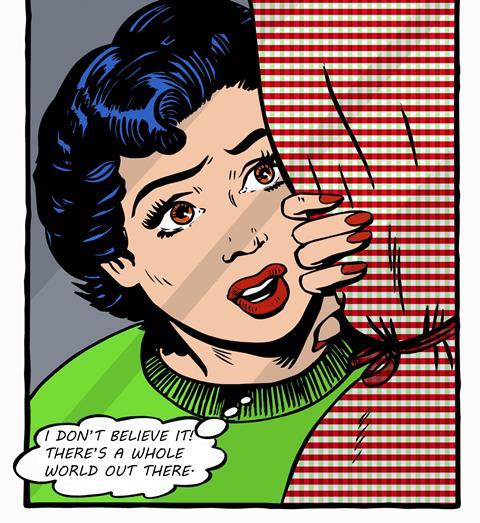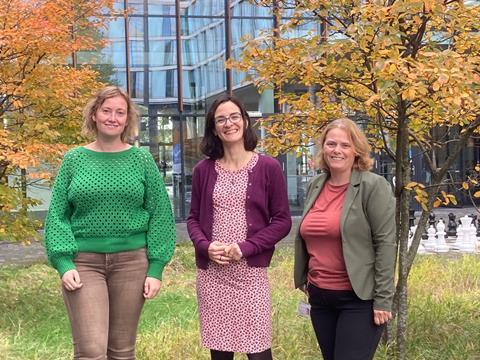
To tackle the increasingly difficult problems the world faces, the team behind the InterSpecial educational initiative believes that the combination of specialisation and interdisciplinarity is key. They are currently developing the programme that seeks to broaden the gaze of specialised students.
What better way to create a programme focused on interdisciplinarity than to work on it with an interdisciplinary team? Alessandra Candian, Annemieke Petrignani and Esther Quaedackers are the core team behind the InterSpecial education initiative of the University of Amsterdam (UvA), and all three have a different background. Quaedackers teaches big history courses at the Institute for Interdisciplinary Science and together with Petrignani, who teaches astrochemistry at the Van ‘t Hoff Institute for Molecular Sciences, came up with the idea of setting up the new initiative. Quaedackers: ‘There already exist interdisciplinary initiatives at the UvA, but those are primarily targeted at students who want to start their studies in an interdisciplinary way. We would like to involve third year disciplinary students who have become relative specialists in their field, and broaden their view.’
’Specialists need to have a broad knowledgebase’
Petrignani complements her colleague. ‘Students who are taught this way are necessary for people in interdisciplinary fields or companies. You can’t do without specialists, but specialists also need to have a broad knowledgebase to be able to communicate well with specialists from other fields.’ Candian, who recently joined the UvA and is assistant professor at the Anton Pannekoek Institute for Astronomy, explains: ‘Generally, students that choose one of the hardcore sciences – like physics, astronomy or chemistry – tend to focus and become experts on a very specific aspect of their field. But even when they keep working in their fields, they will have to collaborate with other experts from different disciplines, so it’s a necessary skill to develop if you want to work in an interdisciplinary team.’
Soft skills
The InterSpecial programme will provide the students with a research question of interdisciplinary character for which in-depth expertise is also needed. ‘An example would be origin of life research’, Candian said. ‘That’s a very diverse topic on which students with different backgrounds will work in small teams, developing technical, scientific and soft skills, like reflecting on collaborative processes.’ Other questions could relate to art and science, future planets, or the initiative AI for Science. Quaedackers also points to the cooperation that could flow from this initiative: ‘The UvA has interfaculty research priority areas, which aim to stimulate innovation by bringing together multiple disciplines from across faculty boundaries. So, it would be interesting to see if we could build on those existing collaborations, but administratively, that could be quite a challenge.’

Connecting to other initiatives should be an option as well, says Petrignani. ‘The infrastructure already exists, so we could build bridges more easily. And we would love for students to present topics or questions from overarching disciplines for the programme as well.’ By grouping students from all kinds of disciplines together, you can also let the students teach each other. ‘By explaining what they already know, they deepen their knowledge’, Quaedackers adds.
Mindset
How will this programme progress over the next five years? Candian humbly proposes: ‘We will have the first few cohorts of expert students who are both confident in their expertise and comfortable in working together.’ Petrignani, however, is a little bolder in her future perspectives. ‘Ideally we will provide our society with students having both the skills and knowledge that are applicable to complex interdisciplinary problems of the world’, she says. ‘Think of economic problems, pandemics, food and health challenges. We don’t want to have an individualistic mindset in our education; rather, we have to use our diversity to have an effect on society.’ Candian adds: ‘We indeed need to fix the mindset. Really thinking outside your own disciplinary box is still missing in a lot of research, and you develop this by working together.’
Being an interdisciplinary team of specialists themselves really helps in developing the InterSpecial programme. ‘We practice what we preach’, Candian says. ‘We all have our own expertise. I have been working in different research departments, so I’m used to cross-discipline meetings and projects. Hence I’m responsible for the coordination, how we can make this project successful with all the different stakeholders.’ ‘The three of us form the core team’, Petrignani clarifies. ‘As Alessandra has been working here briefly, Esther and I provide the links between different parties, me from a chemistry and teacher perspective, and Esther from the interdisciplinary teaching side.’ But there’s obviously more people involved with the project. ‘There will be sound boards, consisting of students, track coordinators, teaching labs, you name it.’
The development of InterSpecial is going strong, but there’s still room for others to join. Quaedackers: ‘If anyone is interested in brainstorming with us, they’re definitely welcome to do so. Send us an email and we’ll figure it out!’












Nog geen opmerkingen